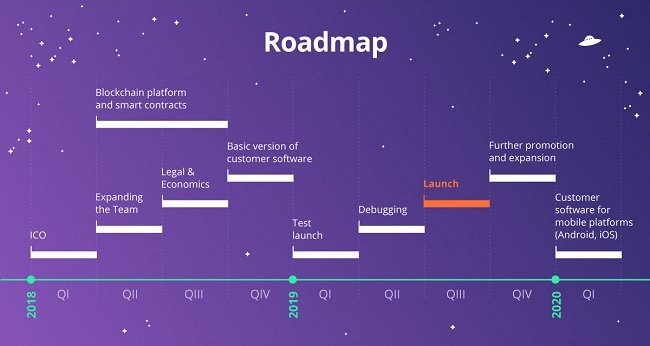
Introduction
Project introduction
Market.space is a distributed self-regulation system for data storage, transmission, and distribution of live content. It performs some non-standard functions as it stands out from the competition:
As a host aggregator, Market.space allows professional hosting providers and data centers to lease unused storage capacity
Our system functions as a free or transaction fee market, affordable price
With Market.space, you can distribute genuine content smoothly and safely by intermediary and cost. This feature is essentially built into the system architecture, but competitors need to centralize and add applications
Responsible data storage is performed according to an algorithm set for Smart Contract. All participants are handled equally and receive compensation for their involvement in data transmission.
The use of general ledger technology is distributed with the involvement of professional hosting providers that support truly safe and reliable service and the supply and demand based quotation system provides affordable prices.
The birth of a market space
The concept of the Market.space platform was completed in the third quarter of 2017. Our team has been actively involved in the development and support of international data storage and transmission projects for over 5 years. Therefore, the idea of a system that enables reliable data storage at affordable prices has been maintained for a long time. Now that the market desperately needs such a system, we have started to develop internal architecture.
Data storage market
Leaders and hope
Today, the number of Internet users has reached 3.8 billion, accounting for nearly 50% of the world population. Developing countries are responsible for the vast majority of users (about 2.5 B). The number of users in developed countries will be about 1 B.
From 2016, the cloud storage market (PCS - Public Cloud Storage) sales are expected to reach $ 2.44 billion, reaching $ 9.9 billion in 2022 (Figure 1). On average, the market increased by 24.8% [1] per year.

Currently, 39% (1.5 B people) of Internet users regularly use cloud storage services. In 2020 this number is expected to rise to 2.3 billion dollars, market penetration rate is expected to rise from 47% to 59% (Fig. 2).

The fastest growth is expected in the Asia Pacific countries (APAC), Latin America, the Middle East and Africa (LAMEA) as analysts [1] predicted.
Key Players
Today, OneDrive (Microsoft), Google, Dropbox, Apple have more than 900 million subscribers in the list of the largest PCS players. Because storage services are built into the ecosystem, Apple is not reflected in most reports. Amazon and Dropbox are now the main B2B line.
Small players active in the market include pCloud, BlackBlaze, FlipDrive, JustCloud and others.
In addition, hosting providers who are responsible for cloud storage services are also entering with software companies like Microsoft and companies that design distributed block chain based storage. This new market segment is now called a collaborative storage cloud.
For further analysis, you need to be careful depending on the type of storage users can aim for SMB or large enterprise. They are also classified as public, private or hybrid by deployment mode (Figure 3) [3]. In the case of hybrid storage, one data is stored in the public cloud server hosting provider and the other part is stored on the long-term leased enterprise's private server. Both the public storage option and the private storage option are built into such storage, so the client can choose the necessary privacy mode.

Growth Driver
Demand from both individuals and companies is increasing now in the market. The latter (in particular SMB) uses large cloud storage services to secure uninterrupted business processes, improve customer support, abandon the traditional IT infrastructure that requires significant commissions and expertise To do.
Large enterprises prefer personal and hybrid storage that saves infrastructure maintenance while enhancing enterprise agility and flexibility. The increase in most industries (demand from manufacturing to mass media) is related to the relatively low data storage and processing costs.
After valuable data is lost, only 6% of companies can survive for more than two years. More than 65% of global companies back up data using cloud storage services. By enhancing the security and anonymity of data, PCS audience targets are expanded for manufacturers, finance, insurance, healthcare companies and retailers that refer to domestic and local government enterprises.
It is also worth mentioning that the demand for hybrid storage continues to increase. In contrast to expensive private storage and dangerous public clouds, it is relatively affordable, flexible and has periodic data leaks.
Basic trend
Currently, the PCS market experiences the following trends.
- Personal storage share in both large enterprises and small businesses increased due to discrepancies in public storage and quality discrepancies
- The function of the cloud service is further advanced. It consists of document editing, opportunities to share safe files, team work and so on.
- Distributed block chain-based storage spread
Market issues
Conventional cloud storage
Despite the increased market penetration, the demand for secure and reliable data storage has not been met yet (this refers to businesses and individuals).
Traditional cloud storage did not meet individual needs, but the amount of data stored by clients varies, but traditional markets are dominated by leading cloud storage vendors. The package price they offer means fixed storage capacity (eg 1 TB) and / or fixed period (eg 1 month).
The lack of design-based encryption and the possibility of third-party data access will still delay many potential users (especially those from the enterprise sector). It is not surprising given the number of reports of data leakage, theft and damage compensation.
In addition, centralized data storage leaves room for data scanning currently prevalent for internal machine learning algorithms. The latter can also extract data from audio or video. In other words, valuable data may be stolen for commercial purposes or transferred to a third party.
Access is usually delayed due to cryopreservation compared to other modes (long-term data retention meaning disposable footage and rare reading). For most hosting providers, transferring data from cold storage to regular mode with immediate access is costly.
Block chain based storage service
Distributed data storage on consumer devices solves security problems. But they do not adapt to high load, they work 24 hours a day, 365 days. This brings specific risk to customers.
- Data can not be accessed if the PC is hosted offline
- Since consumer devices are very vulnerable to corruption, the possibility of data loss is high
- The access speed of the data is potentially low due to the instability of the Internet host channel

TEAM

Additional information: Visit the link below:
Website: http://market.space/en/
Twitter: https://twitter.com/Market_space_
Technical documentation: http://market.space/doc/Market.space_White_Paper_v1.1_en.pdf
Telegram: https://t.me/Market_space
Autor: culun86
ETH: 0xbc37A4d7f960f4d1Dda9153Fb1a1Df7a81278263
Tidak ada komentar:
Posting Komentar